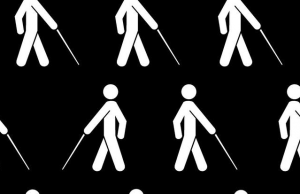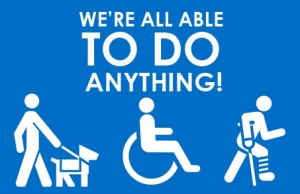Yank and Pull
By Keshia Scott
“Stop! Here, let me help you.” Your hand clenches around my arm and yanks me away from the stairs. You turn me to face you. “There’s a wet floor sign at the bottom of the stairs.” You explain. Your hand encircles my wrist as you start to pull me down the steps.
 I stop. I stare. I yank my hand away and force out, “No. I don’t need your help. I am perfectly able to do it myself.” I give proof of this by going down the stairs alone, the tap of my cane against the sign informing me where the wet floor sign is as I easily go around it. I hear a few students agree with you when you say “No need to be rude. I was just trying to help.”
I stop. I stare. I yank my hand away and force out, “No. I don’t need your help. I am perfectly able to do it myself.” I give proof of this by going down the stairs alone, the tap of my cane against the sign informing me where the wet floor sign is as I easily go around it. I hear a few students agree with you when you say “No need to be rude. I was just trying to help.”
After retelling this to a friend, she asks why I was so rude—after all, she was just trying to help.
I take a deep breath and try to explain to her that I am in a constant fight with others when it comes to good intentions and my person. I point out that in this case, the ‘good Samaritan’ did not ask me if I needed help. She invaded my space and placed her hands on me. She thought she knew better than I did when it came to my mobility and me orienting myself. She assumed her authority over my body and neglected to entertain the possibility of my abilities.
This is not the first time this has happened. Is there something about the disabled body that screams out child, senseless, mindless and hopeless? Is this why an able-bodied person can’t help but feel pity and take control? And why shouldn’t they? After all, people with dis—disabled people aren’t able to function, aren’t able to live a productive life, aren’t able to truly live—they’re, just existing. All we can do is help them, be kind, and make sure they don’t hurt themselves. We know better. We can do things they can’t. It is this kind of superiority complex that I absolutely abhor, one that involves a blatant disregard for personal space and independence based on an unproven assumption, which I absolutely abhor.
I understand why some people may argue about the problem being a manifestation of our society, that it is deeply embedded in our culture, and is a result of consistent training since infancy by most religions. Popular Biblical readings that are taught to young children always seem to indicate the need for able-bodied people to help their disabled counterparts. These arguments, old as they may be, always take a segmented view of such issues. It is also important to take note of the fact that such arguments are relative and should take into account social changes. What happened to common courtesy? What happened to progressive thinking? We have seen a revolution of thought in matters pertaining to sexual orientation, marriage, and abortion, so why can’t this be applied to ableism?
Postmodern developments in technology, medicine, architecture, communication, and most fields that are influenced by scientific research have made life much easier for everyone. As a consequence, independence is one of the most fundamental needs of life. We all want to take care of ourselves and our families. Why then would someone ignore another’s need for personal space? Why assume that your help is needed? Today, people with disabilities participate in renowned sporting events, navigate complex education, financial and political systems and contribute to science and technology, economics, etc. Why does society continue to hang onto old-fashioned misconceptions?
 I don’t mean to trivialize the benefits of a communal perspective. I just do not understand why people would take it upon themselves to impose their will on others, regardless of their reasons. From taking my credit card out of my hand to swipe at Publix, asking the person I came with how they can best assist me, answering questions put to me, yanking me into the street when it was time to cross, telling my guide dog to go left or right, placing my hands on the braille numbers in the elevator, the doctor asking the person I came with about my medical history, handing the receipt to a friend when I paid, to automatically signing my name on paperwork – these situations have all happened to me more than once – and each time I retell it to someone without a disability, there is always that one person who does not understand why I get angry. They argue, “They were just trying to be helpful.”
I don’t mean to trivialize the benefits of a communal perspective. I just do not understand why people would take it upon themselves to impose their will on others, regardless of their reasons. From taking my credit card out of my hand to swipe at Publix, asking the person I came with how they can best assist me, answering questions put to me, yanking me into the street when it was time to cross, telling my guide dog to go left or right, placing my hands on the braille numbers in the elevator, the doctor asking the person I came with about my medical history, handing the receipt to a friend when I paid, to automatically signing my name on paperwork – these situations have all happened to me more than once – and each time I retell it to someone without a disability, there is always that one person who does not understand why I get angry. They argue, “They were just trying to be helpful.”
And yet, I’m always the one having to explain, to justify my anger. I have to do these things not only for the benefit of the person who is roughly handling me but also for the benefit of the person I am retelling the story to. Both are dismissing me: they both know better, one has good intentions and one can’t understand why I won’t recognize the good intention, and both are shaming me for my anger and defiance. That’s one of the most annoying issues.
The fact that some people choose to shame me for failing to recognize an act of ‘generosity’ is almost like someone twisting a double-edged sword in my back. As already implied, the repetitive nature of such events is a tremendous contributor to the hopelessness that gives rise to frequent outbursts among victims. From a reactionary perspective, I have tried numerous strategies. I have tried being polite. I have tried ignoring. It’s like a cyclic series of events. I can correct one person but a week later, the same problem occurs. My body may seem broken, I may seem like I don’t know where I am going or what I am doing – but if you just wait for me to ask, then we would be content.
 From a personal perspective, I feel that people should understand the irritation that emanates from such actions. While there is nothing wrong with offering or receiving help, it is essential that actions be preceded by at least the indication of a request. An implementation of such proactive tactics is bound to ease all our lives within the community. I am not a teachable moment. I do not need to prove that I am capable of doing things. I do not need to take time out of my day to explain to you why I was pissed that you grabbed, yanked and pulled me. It amounts to time wasted that is bound to occur repeatedly as more and more people continue to make similar mistakes. Also, being gracious to people who are being invasive of your personal space is extensively exhausting. Like my peers, I desire to be treated like every other person. With this in mind, I think people should ask themselves whether they would grab, yank, pull, move, place, or adjust an able-bodied stranger. If not, why do it to me? Finally, my attempts to defend myself are not in any way an indication of rudeness. People should at least try to understand my position. I do not owe anyone the courtesy of a polite rejection. Not when it is I that is being consistently handled without permission and dismissed for my defiance. I am not an object.
From a personal perspective, I feel that people should understand the irritation that emanates from such actions. While there is nothing wrong with offering or receiving help, it is essential that actions be preceded by at least the indication of a request. An implementation of such proactive tactics is bound to ease all our lives within the community. I am not a teachable moment. I do not need to prove that I am capable of doing things. I do not need to take time out of my day to explain to you why I was pissed that you grabbed, yanked and pulled me. It amounts to time wasted that is bound to occur repeatedly as more and more people continue to make similar mistakes. Also, being gracious to people who are being invasive of your personal space is extensively exhausting. Like my peers, I desire to be treated like every other person. With this in mind, I think people should ask themselves whether they would grab, yank, pull, move, place, or adjust an able-bodied stranger. If not, why do it to me? Finally, my attempts to defend myself are not in any way an indication of rudeness. People should at least try to understand my position. I do not owe anyone the courtesy of a polite rejection. Not when it is I that is being consistently handled without permission and dismissed for my defiance. I am not an object.
Keshia Scott is graduating with a BA in English and gender studies at the University of North Florida. She is interested in disability studies, racial studies, gender studies and literary studies and how they all intersect. You can find more of her writing on her blog.




0 comments